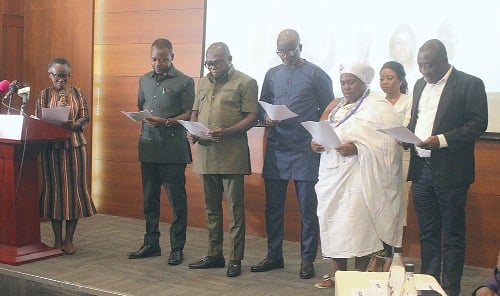The Ghanaian media landscape is undergoing a period of significant transformation, marked by both opportunities and challenges. Deputy Presidential Spokesperson, Shamima Muslim, emphasized the need for the media, particularly the print industry, to embrace technological advancements to enhance professionalism and navigate the evolving media ecosystem. While electronic media continues to flourish, print media faces existential threats due to changing consumption habits and the rise of digital platforms. Innovation and adaptation are crucial for survival in this dynamic environment. Muslim’s call for modernization underscores the importance of leveraging technology to improve journalistic practices, expand reach, and ensure the sustainability of the print media sector. This adaptation is not merely a technological imperative, but a strategic necessity for maintaining the relevance and impact of print media in the face of digital disruption.
Ms. Muslim also addressed the critical issue of journalist safety, assuring the media of the government’s commitment to protecting practitioners from harassment and abuse. Highlighting the symbiotic relationship between the government and the media, she stressed that attacks on journalists are unacceptable and undermine the democratic process. The government’s commitment to fostering a safe and enabling environment for journalists is crucial for maintaining press freedom and ensuring accountability. This assurance seeks to rebuild trust and strengthen the media’s role as a watchdog, holding power to account without fear of reprisal. The emphasis on mutual respect and collaboration between the government and the media is essential for a thriving democracy.
National Media Commission (NMC) Chairperson, Professor Akua Opokua Britwum, provided a comprehensive analysis of the challenges facing the media industry. These include escalating production costs, low literacy levels, and the disruptive influence of new technologies. However, Professor Britwum posited that these challenges should be viewed as opportunities for reform and innovation. She advocated for a holistic approach to media development, emphasizing the interconnectedness of the media with national development. This perspective underscores the importance of integrating media development strategies within broader national development frameworks. The challenges facing the media are not isolated issues but are intertwined with societal, economic, and technological factors that shape the national landscape.
Professor Britwum further explored the evolving media consumption patterns, highlighting the impact of gender dynamics, time constraints, and the pervasive influence of social media on readership and ethical standards. The proliferation of social media has created new avenues for information dissemination but has also contributed to the spread of misinformation and the erosion of traditional journalistic ethics. The NMC’s call for a renewed focus on ethical practices is a timely reminder of the importance of upholding journalistic integrity in the digital age. Maintaining ethical standards is crucial for building public trust and ensuring the credibility of news reporting. The new PRINPAG leadership is tasked with navigating these complex challenges and developing sustainable strategies to uphold journalistic principles in the face of evolving societal trends.
The newly elected President of the Private Newspaper and Online News Publishers Association of Ghana (PRINPAG), David Sitsofe Tamakloe, outlined his vision for the association, emphasizing capacity building through continuous training and mentorship programs. Recognizing the need for professional development, Tamakloe stressed that training should be an integral part of the journalistic culture. This commitment to ongoing learning and skills enhancement is essential for equipping journalists with the tools and knowledge necessary to thrive in the changing media landscape. Investing in training ensures that journalists can adapt to new technologies, enhance their reporting skills, and uphold ethical standards in their work.
Tamakloe also addressed the crucial issue of resource allocation within the media industry. He pledged to engage advertisers and state institutions to ensure a more equitable distribution of resources, emphasizing that advertising should be viewed as a mutually beneficial exchange rather than an act of charity. This approach seeks to promote a sustainable financial model for media organizations, enabling them to fulfill their vital role in informing the public and holding power to account. By fostering a more equitable relationship between media outlets and advertisers, PRINPAG aims to strengthen the financial viability of the industry and ensure its independence. Furthermore, Tamakloe’s call for a return to ethical principles underscores the importance of integrity and truth-seeking in journalism. His rejection of sensationalism and misinformation reflects a commitment to upholding journalistic values and promoting responsible reporting practices.


